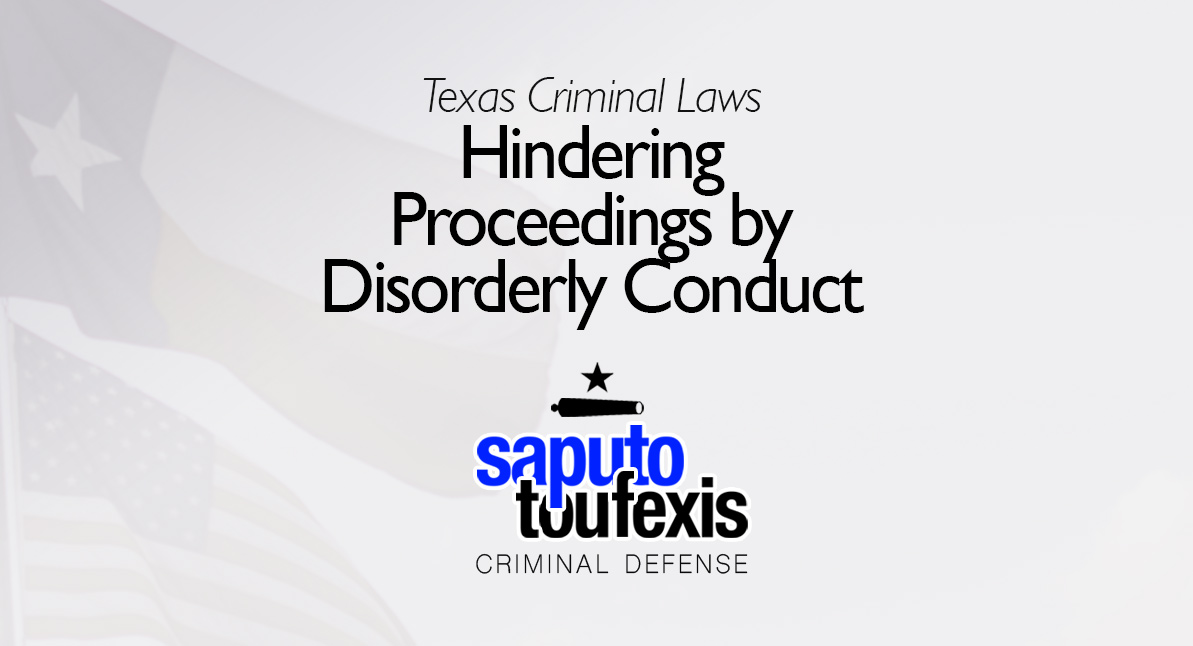The Texas Hindering Proceedings by Disorderly Conduct law gives police the right to arrest you if they believe you intentionally hindered an official proceeding by making noise, acting violently, or making a disturbance, or if you didn’t do so intentionally, you continued to do so after an explicit official request to desist.
FAQs about the
Hindering Proceedings by Disorderly Conduct law in Texas
- What is the current Texas law about Hindering Proceedings by Disorderly Conduct?
- What is the penalty for a Texas Hindering Proceedings by Disorderly Conduct offense?
- How can I be charged with a Hindering Proceedings by Disorderly Conduct offense in Texas?
- What is the statute of limitations for Hindering Proceedings by Disorderly Conduct in Texas?
- Can you get probation for Hindering Proceedings by Disorderly Conduct in Texas?
- What level of crime is Hindering Proceedings by Disorderly Conduct in Texas?
The Texas legislature codified this criminal offense in Texas Penal Code Section 38.13. The legislature did not update this law in 2025. In fact, this law has not been amended since 1993.
The Penal Code classifies the Texas Hindering Proceedings by Disorderly Conduct law under Title 8 “Offenses Against Public Administration,” Chapter 38 “Obstructing Governmental Operation.” Learn more about the Texas offense of Hindering Proceedings by Disorderly Conduct below.
What is the current Texas law about Hindering Proceedings by Disorderly Conduct?
AV Preeminent Texas lawyer Paul Saputo provides the current law defining Hindering Proceedings by Disorderly Conduct in Penal Code Section §38.13, as follows:[1]
(a) A person commits an offense if he intentionally hinders an official proceeding by noise or violent or tumultuous behavior or disturbance.
(b) A person commits an offense if he recklessly hinders an official proceeding by noise or violent or tumultuous behavior or disturbance and continues after explicit official request to desist.
What is the penalty for a Texas Hindering Proceedings by Disorderly Conduct offense?
A conviction for Hindering Proceedings by Disorderly Conduct in Texas is punished as a Class A misdemeanor,[2] with a maximum possible fine under Texas state law of up to $4,000 and jail time of up to one year.
How can I be charged with a Hindering Proceedings by Disorderly Conduct offense in Texas?
You can be charged with Hindering Proceedings by Disorderly Conduct in Texas if the state’s attorneys believe that each of the elements of §38.13(a)(b) as described in the section above have been met.
What is the statute of limitations for Hindering Proceedings by Disorderly Conduct in Texas?
As a misdemeanor, Hindering Proceedings by Disorderly Conduct charges have a two-year limitations period.[3]
Can you get probation for Hindering Proceedings by Disorderly Conduct in Texas?
The Texas Code of Criminal Procedure allows both judges and juries to grant probation for Hindering Proceedings by Disorderly Conduct, and judges are also allowed to accept deferred adjudication plea deals.[4]
What level of crime is Hindering Proceedings by Disorderly Conduct in Texas?
The Penal Code classifies Hindering Proceedings by Disorderly Conduct as a Class A misdemeanor.
Learn more about the penalty range for this offense in the section above.
Legal References:
^1. Texas Penal Code §38.13. This law is current as of 2025.^2. Texas Penal Code §38.13(c)^3. See Code of Criminal Procedure 12.02(a)^4. See Chapter 42A, Texas Code of Criminal Procedure, Art. 42A.054, Art. 42A.056, Art. 42A.102










